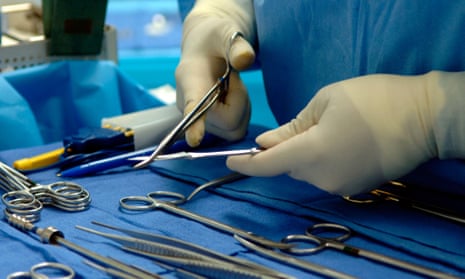The Chinese government may have been systematically falsifying its organ donation numbers, raising renewed concerns over the use of executed prisoners and other forced donors for transplants, a new academic paper says.
In 2015, China publicly promised it would no longer source organs from executed prisoners, previously almost its sole source. But a study led by Australian National University PhD student Matthew Robertson, published in the BMC Medical Ethics journal on Friday, says Chinese-government supplied datasets on organ donations show “highly compelling evidence they are being falsified”.
Using statistical forensics on the datasets, researchers found the numbers of organs reportedly transplanted almost perfectly matched a mathematical formula – a quadratic function.
“When you take a close look at the numbers of organs apparently collected they almost match this artificial equation point for point, year in, year out. They’re too neat to be true,” Robertson said.
“These figures don’t appear to be real data from real donations. They’re numbers generated using an equation. It is difficult to imagine how this model could have been arrived at by mere chance, raising the distinct possibility that it was intended to deceive.”
The BMC Medical Ethics paper argued China’s organ transplant industry was opaque and the sources of organs difficult to trace. It found that while China had reformed its organ transplantation system to an extent, this was used to mask the continued use of non-voluntary donors or donors who are coerced into giving organs.
“Rather than the solely prisoner-based organ transplant system of years past, or the untarnished voluntary system promised by officials, the available evidence indicates in our view that China has a complex hybrid transplant program: voluntary donations, incentivised by large cash payments, are apparently used alongside nonvoluntary donors who are marked down as citizen donors.”
The study examined voluntary hospital-based donated organs between 2010 and 2018 using data provided by two Chinese sources.
The China Organ Transplant Response System (COTRS) forms the basis of China’s current voluntary organ donation system: every organ transplant is supposed to be allocated solely through it. The Red Cross Society of China is mandated to verify every such organ donation.
Data from COTRS is not usually publicly available, but it has been published twice – in 2014 and in 2017. Data from the Red Cross Society of China was previously available on four websites: three of the websites have recently been taken offline. The dataset is currently available at www.codac.org.cn.
The issue of Chinese organ donation practices – in particular the harvesting of organs from executed prisoners and minority groups such as ethnic Uighurs – has long been a major international human rights issue. And concerns have consistently been raised about the veracity of Chinese transplant data.
An independent report published by the International Coalition to End Transplant Abuse in China in 2016 estimated that at least 60,000 transplants occur in China annually, a figure obtained by adding up estimates of transplant activity – bed numbers, occupancy levels, surgical teams, new buildings and so on – at hundreds of hospitals across the country.
In June this year, The China Tribunal, led by Sir Geoffrey Nice QC – formerly a prosecutor at the International Criminal Tribunal for the former Yugoslavia – released a summary of its forthcoming final report, finding “in China forced organ harvesting from prisoners of conscience has been practiced for a substantial period of time involving a very substantial number of victims”.
Falun Gong practitioners were the main source of organs, the tribunal found, but it also said that Uighurs were undergoing medical testing on a scale that could allow them to become an “organ bank”.
“The conclusion shows that very many people have died indescribably hideous deaths for no reason, that more may suffer in similar ways … there is no evidence of the practice having been stopped and the tribunal is satisfied that it is continuing.”
China has consistently denied the use of organs harvested from executed prisoners since promising to stop the practice. China first admitted to using prisoners as donors in 2005, and vowed to end the practice in 2013, again in 2014, before saying the practice ended in 2015.
China has consistently insisted it adheres to international medical standards requiring organ donations be made by consent and without any financial incentive. It has said international allegations of impropriety are politically motivated and untrue.
The BMC Medical Ethics paper was reviewed by Sir David Spiegelhalter, a former president of the Royal Statistical Society in the UK.
“The anomalies in the data examined ... follow a systematic and surprising pattern,” Spiegelhalter wrote.
“The close agreement of the numbers of donors and transplants with a quadratic function is remarkable and is in sharp contrast to other countries who have increased their activity over this period ... I cannot think of any good reason for such a quadratic trend arising naturally.”
Chinese state officials, on the back of the promised reforms, have been admitted onto the World Health Organization’s transplantation task force, and Chinese surgeons now regularly present at medical conferences and publish in international journals.
“China’s return to the fold was predicated on a revolution in organ sourcing practice, supported by the data we have forensically analyzed. Given that this data appears to have been falsified, international medical organisations may wish to reassess their stance,” the paper argues.
“The welcoming of China’s organ transplantation system into the international medical community has been based on trust: in light of our findings, we believe this trust has been violated.”
